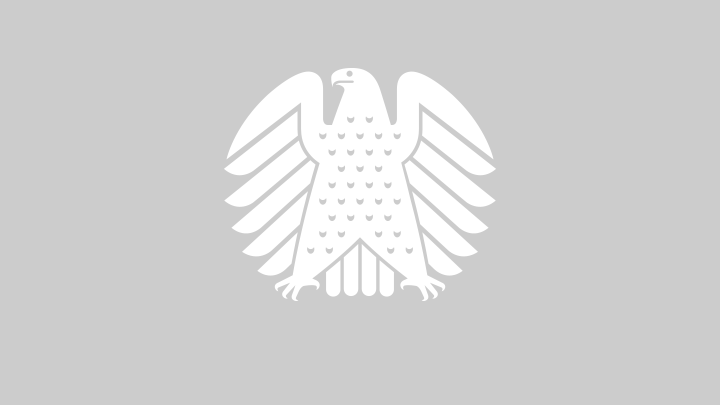CDU/CSU remains strongest parliamentary group in the Bundestag despite losses

The distribution of seats in the 19th German Bundestag based on the official results. (© German Bundestag/Schmitz/Klimpel)
Despite a significant drop in its vote share, the CDU/CSU remains the largest parliamentary group in the Bundestag. In the elections to the 19th German Bundestag on Sunday, 24 September 2017, according to the preliminary election results issued by the Federal Returning Officer, the CDU won 26.8 % of second votes (2013: 34.1 %). Together with the CSU in Bavaria, with its 6.2 % (2013: 7.4 %), the CDU/CSU parliamentary group has gained a total of 32.9 % of second votes (2013: 41.5 %). The SPD is the 2nd strongest parliamentary group in the Bundestag at 20.5 % of the vote, also suffering a clear drop in voter support compared with 2013 (25.7 %).
Bundestag newcomer AfD is third largest group
The Alternative for Germany (AfD) will be the third largest parliamentary group, with 12.6 % of the vote, entering Parliament for the first time. In 2013, the party received 4.7 %, failing to clear the five-percent hurdle for entry to the Bundestag. The FDP, which gained 4.8 % in 2013, thus also failing to re-enter Parliament, won 10.7 % of second votes this time around, meaning that it will now once again be able to take up seats in the Bundestag.
The Left Party, after four years as the largest of the two opposition parliamentary groups, has narrowly increased its vote share, with 9.2 % compared with 8.6 % in 2013. Alliance 90/The Greens also slightly improved its share of the vote, gaining 8.9 % compared with 8.4 % in 2013.
In total, the second votes won by all the other 27 parties which had presented party lists in the Länder amounted to five percent of second votes. One percent of second votes cast were invalid (2013: 1.3 %), along with 1.3% of first votes (2013: 1.5 %).
The new German Bundestag will have 709 Members
The new 19th German Bundestag will consist of 709 parliamentarians – 78 more than after the 2013 elections, 79 more than at present and 111 more than the minimum of 598 seats. The CDU will have 200 seats (2013: 255), of which 185 will be direct mandates won on a first-past-the-post basis in the constituencies (2013: 191); whilst the CSU will have 46 seats (2013: 56), all of them direct mandates (2013: 45 direct mandates). This gives the CDU/CSU parliamentary group a total of 246 Members in the Bundestag, 231 of whom won their seats directly.
The SPD has 153 seats (2013: 193), 59 of them direct mandates (2013: 58). The AfD has 92 seats in the Bundestag, including two direct mandates in Saxony. The third direct mandate was won by Dr Frauke Petry. On 25 September, the day after the election, she announced that she would not belong to the AfD parliamentary group, but instead sit in Parliament as an independent Member. On 12 October, Mario Mieruch, who had been elected via the Land list for North Rhine-Westphalia, also announced that he was leaving the AfD parliamentary group, as well as leaving the party. This means that the AfD, which originally won 94 seats, now only has 92 seats.
Five Direct mandates for the Left Party
The FDP has 80 seats, none of them won directly in the constituencies. The Left Party, meanwhile, won direct mandates in five constituencies (2013: four direct mandates) and now has 69 seats (2013: 64). As in 2013, the Greens were able to win one constituency directly and will have 67 Members in the Bundestag in the new electoral term (2013: 63).
At total of 111 ‘balance seats’ – additional seats intended to balance out the direct mandates – have been generated, to be shared out amongst the parties as follows: CDU 36, SPD 22, AfD 11, FDP 15, The Left Party 10, Alliance 90/The Greens 10, CSU 7.
Turnout was 76.2 percent
At 76.2 %, voter turnout was somewhat higher than at the previous elections four years ago (71.5 %). In 2009, the lowest turnout in the history of the Federal Republic of Germany was recorded at 70.8 %.
Of those parties which failed to clear the five-percent hurdle for entry to Parliament, the Freie Wähler and Die Partei both received one percent of second votes. The Tierschutzpartei (‘Animal Welfare Party’) received 0.8 %, the Pirates and the NPD both received 0.4 % and the ÖDP 0.3 %, whilst the Bündnis Grundeinkommen (‘Basic Income Alliance’) received 0.2 % and the following parties received 0.1 % each: Bayernpartei (‘Bavarian Party’), MLPD (‘Marxist-Leninist Party’), Allianz Deutscher Demokraten (‘Alliance of German Democrats’), Tierschutzallianz (‘Animal Welfare Alliance’), Demokratie in Bewegung (‘Democracy on the Move’), die Deutsche Mitte (‘The German Centre’), die Partei für Gesundheitsforschung (‘Party for Health Research’) and the V-Partei (‘Party for Change, Vegetarians and Vegans’). One percent of the second votes cast were invalid. (13.10.2017)